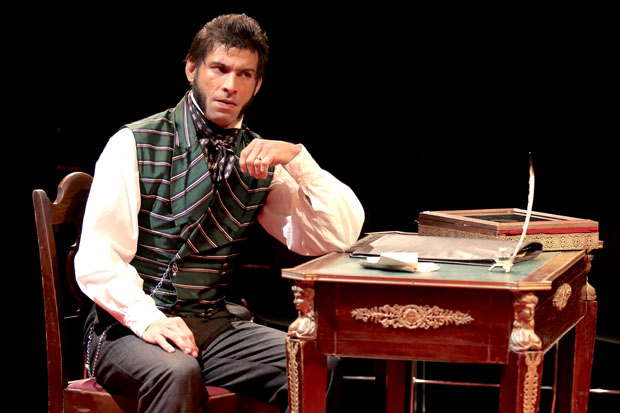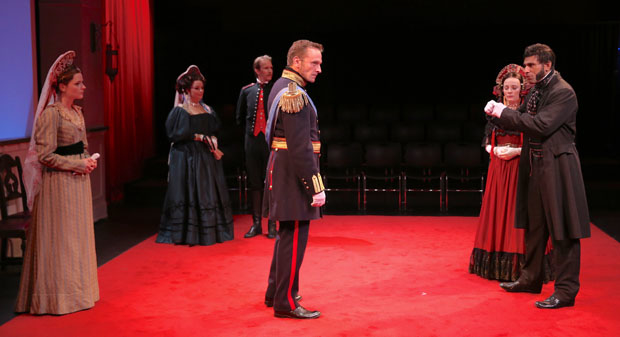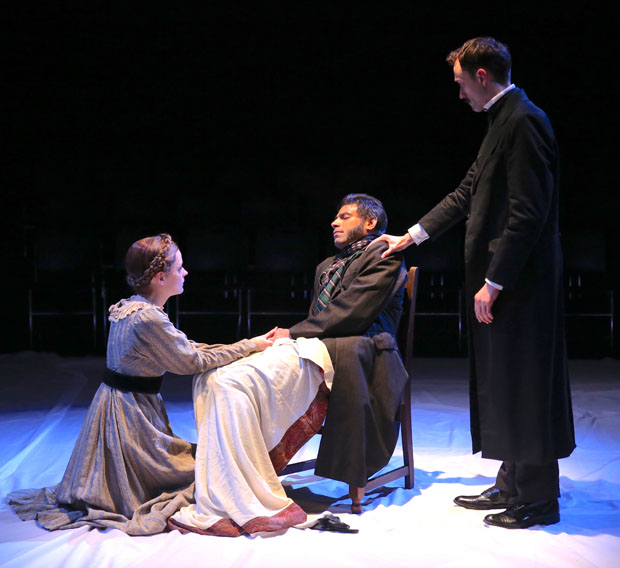Pushkin Brings the Russian Winter to a New York August
Jonathan Leaf’s verse drama about Alexander Pushkin makes its world premiere.

(© Carol Rosegg)
The central figure in Russian Romanticism, Alexander Pushkin really did lead a romantic life: He was descended from an African immigrant who became an important Russian engineer. Exiled by one Tsar for his subversive writing, Pushkin was (for the same reason) drawn into the smothering embrace of another, only to die at the tragic age of 37 from wounds sustained in a duel.
It's rich source material, which is why it is almost impressive how boring playwright Jonathan Leaf manages to make his story in Pushkin, the musty costume drama now playing at the Sheen Center under the auspices of American Vicarious (the troupe behind last season's snoozer If Only…). This is Pushkin's world premiere, but the script has been banging around New York since 2000. Within the first five minutes of this soporific verse play, we know why it has hitherto remained unproduced.
Most of Leaf's lines sound like they belong in a teleplay circa 1955, and the uniformly wooden (until suddenly melodramatic) acting follows suit. We watch Pushkin (Ian Lassiter) suffer through the edits that Tsar Nicholas I (Gene Gillette) makes to his masterpiece, Eugene Onegin. In turn, he attempts to cajole the emperor into freeing the serfs. Meanwhile, he shares secret poems critical of Russian involvement in the Caucasus with his friends, Gogol (Kyle Cameron) and Baron Delvig (Daniel Petzold).

(© Carol Rosegg)
This thrilling sedition is the most interesting aspect of Pushkin's story, but most of the play is preoccupied with the intrigue surrounding the Tsar, imperial guardsman Georges-Charles D'Anthes (Christopher Kelly), and Pushkin's wife, Natalya (Jenny Leona). While everyone suspects Pushkin has been cuckolded by one (or both) of these men, he engages in his own affair with Natalya's sister, Alexandra (Lexi Lapp). All of this leads to his inevitable demise, foretold from the opening moment when Pushkin places a dueling pistol in an ornamental casket.
It's mostly downhill from that arresting first image in director Christopher McElroen's sluggish production. McElroen stages the play in traverse (where one half of the audience faces the other half from across the stage) on Troy Hourie's attractive but poorly utilized set. While this is usually a confrontational layout, here it only allows you to watch fellow audience members nod off. Leaf's short scenes (some of which conclude in rhyming couplets) suggest a Shakespeare history. They might benefit from a fluid staging, with one scene leading seamlessly into the next. Instead, McElroen breaks them up with long transitions during which a crew of serfs needlessly rearranges the furniture.
At least sound designer Andy Evan Cohen gives us something nice to hear with his well-selected transition music. Even anachronistic selections, like the waltz from Khachaturian's Masquerade suite (written a century after the events of this play), offer the aural equivalent of caviar and velvet. Such Russian opulence also comes through in Elivia Bovenzi's richly patterned and well-tailored costumes.

(© Carol Rosegg)
Unfortunately, dazzling kokoshniks and epaulets are not enough to disguise a dreary script, which is heavy in biblical allusions but light in dramatic tension. Leaf has made the ballsy choice to cast his own original verse, cliché-ridden lines that rhyme "love" with "above," in the role of Pushkin's unpublished work.
All of this represents a wasted opportunity when one considers the machine that Pushkin raged against: A system in which an elite few prosper off the backs of the impoverished Russian masses, while an arrogant Tsar pursues adventurism in the Muslim World, convinced that he is the last champion of Christendom in the face of a fallen West. These themes echo into our time, but you wouldn't suspect so after seeing Pushkin, a play that feels as remote and frozen as Siberia.







